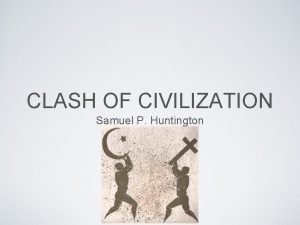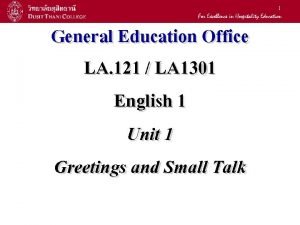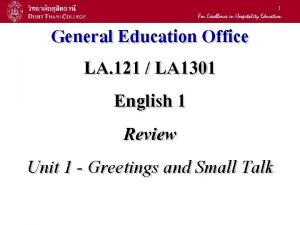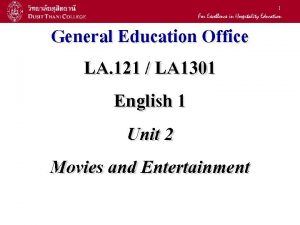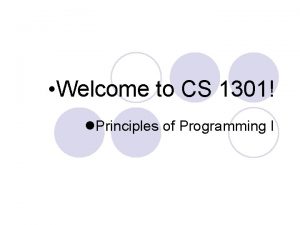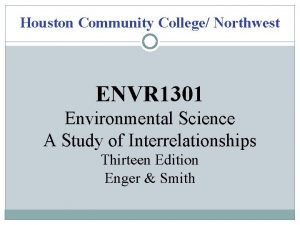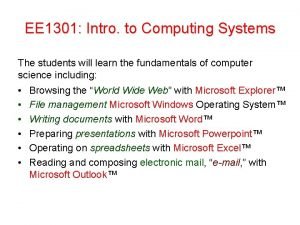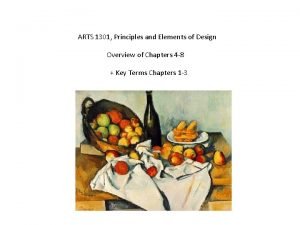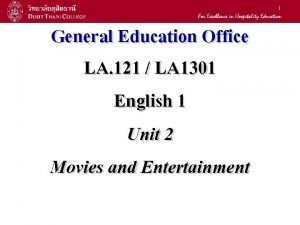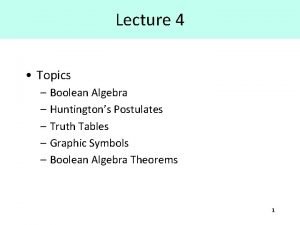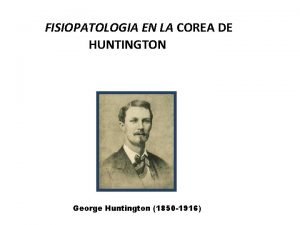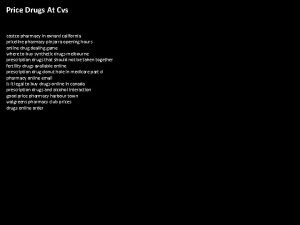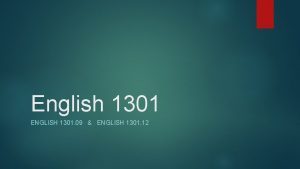Welcome to English 1301 Instructor Samuel D Huntington















- Slides: 15

Welcome to English 1301! Instructor: Samuel D. Huntington Email: samuel. huntington@hccs. edu Office Hours: Immediately before and after class and by appointment; place can be arranged E-learning site: http: //learning. hccs. edu/faculty/samuel. huntington

Requirements and Materials � Online Access for the Learning Web, Turnitin. com, and Mc. Graw Hill Connect: � � Syllabus, presentations, and out of class assignment sheets on the learning web; turnitin. com for uploading final drafts of essays; and Mc. Graw Hill Connect for the personalized learning plan (more later). Textbooks: � � � The Writer’s Presence: A Pool of Readings. Ed. Donald Mc. Quade and Robert Atwan. 7 th ed. Boston: Bedford, 2012. ISBN-13: 978 -0 -312 -67262 -1; The Mc. Graw-Hill Handbook. Ed. Elaine Maimon, Janice Peritz, and Kathleen Yancey. 3 rd ed. Comp 1 Study Guide: The Process of Writing.

Additional Materials � � � Notebook with perforated sheets Folder with pockets Pens (that don’t “bleed”) Two essay examination booklets (“Blue Book”) Save ALL out of class files (lists, free-writes, rough drafts, and final drafts) on some sort of file saving device (have backups)

Syllabus Highlights � Attendance: Daily quiz/prompt at the beginning of class; � allowed 2 absences without impact on the grade; � 3 or more absences may result in a drop or failure of the course; � Also: every 3 tardies* equals 1 absence. � *A tardy is defined as coming late or leaving early. �

Syllabus Highlights � Late Work: Out-of-class essays: for every calendar day late, a full letter grade will be deducted; � In-class work (including daily quiz/prompt) will not be made up; � Midterm essay examination: for every calendar day not taken, a full letter grade will be deducted. � � Plagiarism: 1 st offense: “ 0” on the assignment � 2 nd offense: “ 0” for the course �

Syllabus Highlights � Technology Use: � � Unless given strict approval by the instructor (or school approved accommodations), all technology is “off”; Times will be designated for technology use: writing, drafting, searching, etc. Yet, when the instructor indicates the time is up: it is up! Unapproved use will result in a warning the first time; each additional offense will disqualify that student’s quiz score for the day; “Accidental” use (phones ringing/vibrating) will also have a first time warning and disqualifications for additional offenses.

Assignments and Assessments � � � � � Daily Quiz/Prompt: 100 points (10% of Total Grade (TG)) Homework: 50 points (5% TG) Personalized Learning Plan*: 100 points (10% TG) Personal Experience Essay: 100 points (10% TG) Critical Comparative Essay: 150 points (15% TG) Collaborative Position Essay: 100 points (10% TG) Rogerian Argument Essay: 150 points (15% TG) Midterm Process Analysis Essay: 100 points (10% TG) Final Exam Essay: 150 points (15% TG)

Personalized Learning Plan � � Available through Mc. Graw Hill Connect: http: //connect. mcgrawhill. com/class/s_huntington_24103_1 Registration Due 8/30 Part 1) Diagnostic Exam (Due 9/4); Part 2) Personal Plan (Due 10/5); Part 3) Post-Assessment (Due 10/12) Completion Grade: If you finish 85%, then you get 85% for the grade; In addition, if your postassessment score improves from your diagnostic score, then you will earn a 5 -point bonus!

Turnitin. com � � � Class ID: 5432074 Enrollment Password: Eng 1301 F 8 w 12 (case sensitive) Enrollment Due 8/30

Time for Introductions � � � On one side of the index card, provide the following information: Student’s Full Name (and preferred name/nickname) and contact information (student email, the one you check and the Lone Star account). 1. List the places where you have lived. 2. Favorite sports and teams. 3. Favorite music/movie/tv show/book. 4. Favorite vacation (both real and desired). � � � On the other side of the index card, provide the following information: 1. List all languages that you read, write, or speak in. 2. What are your perceived strengths in English? 3. What are your perceived weaknesses in English? 4. Provide any circumstances that you think the instructor should be made aware of.

Reading Critically and Writing Academically � � � Individually, write down your previous experiences with reading and writing for school: how much, how often, types of assignments, etc. In pairs, discuss and write down what you think will be the expectations for reading and writing at the college level. Class Discussion

Writing Diagnostic � � In 10 -minutes, write a brief essay about what or who influenced you the most in being at college and why. In addition, discuss what your specific goals are for this course and how you plan on achieving those goals. After the 10 minutes, we’ll take a 10 minute break.

Rhetorical Situation � � � The social, political, biographical, and historical context surrounding the text when the writing takes place and when it becomes public Purpose: the author’s goal (inform, persuade, entertain, analyze, etc. ) Relationship among subject, author, and audience: establishing appeals to logos, ethos, and pathos

The Personal Narrative Peer Groups � � � � A: David Garza, Moises Ruiz, Dana Medeiros, Celina Bustos; B: Rebecca Trapp, Demetria Johnson, Zaira Contreras; C: Bright Osagie, Ethan Powell, Esther Koutouan; D: Alexander Rudnik, Kenneth Offodile, Ioana Zaharia; E: Edward Smith, Megan Servaes, Kimberly Heines; F: Carolkim Le, Minh Do, Prasetya Koesoemadinata; G: Kasper Egholm, Cathy Banh, Geraldine Carranza; H: Odette Zouga Oyono, Chelsea Bettis, Jacqueline Scott

Homework � � � Read: WP Sherman Alexie, “The Joy of Reading and Writing: Superman and Me” (27), David Sedaris, “Me Talk Pretty One Day” (212), Amy Tan, “Mother Tongue” (232), Langston Hughes on How to Be a Bad Writer (in Ten Easy Lessons) (121), Stephen King, “Everything You Need to Know About Writing Successfully—in Ten Minutes” (451), and George Orwell on the Four Reasons for Writing (538) Register for Turnitin. com and Personalized Learning Plan Verify your email address with the instructor by sending a confirmation email to samuel. huntington@hccs. edu
